No Guarantees: The Strange Story of the Super Bowl III Conspiracy Theory
It’s three days before Super Bowl III and the young, flamboyant and highly paid quarterback of the AFL champion New York Jets is leaving a Miami nightclub. As usual, Joe Namath is surrounded by an entourage of attractive young ladies and eager sportswriters.
From a few feet away a fan of the highly favored Baltimore Colts begins to heckle Broadway Joe. Namath and his fellow Jets have been getting grief all week from both the fans and the media in Miami.
“Hey Namath,” the cocky Colts fan yells, “we’re gonna kick your ass!”
Joe Namath stops in his tracks. He turns around and yells back, “The Jets are gonna win the game. I guarantee it.”
Never known to be one who keeps his mouth shut, the fact that Namath yelled back at a heckler comes as no real surprise, but the boldness of his guarantee causes everyone to stop and take notice.
The Colts are 19 to 1 favorites in Super Bowl III. All the experts and odds makers are predicting that Baltimore will trounce the upstart New York team from the upstart American Football League by at least three touchdowns.
Three days later, at approximately a quarter past five in the afternoon on January 12, 1969 Joe Namath will run off the field at Miami’s Orange Bowl with his hand held high, flashing as iconic number one skyward, as the Jets reign victorious and shock the world by beating the Baltimore Colts 16 to 7 in Super Bowl III.
Joe Namath’s guarantee will go down in football and American pop culture lore and the New York Jets will become the first and only American Football League team to defeat a team from the long standing National Football League in the Super Bowl prior to the merger of the two leagues the following year in 1970.
When Namath guaranteed the Jets would win Super Bowl III he did it with such confidence and bravado that it seemed as if it truly was guaranteed that the Jets would shock the world and win the game. Was it? Or was Namath just being the ever confident Broadway Joe Namath when he made his bold guarantee in Miami?
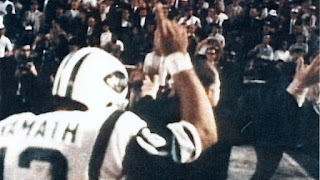
Namath and his iconic #1 after Super Bowl III
The Colts of 1968 were a powerhouse of a football team. The Baltimore Colts at that time are steeped in a winning tradition dating back over a decade. They are led by a young and upcoming Coach in Don Shula and Baltimore has steam rolled its way to Super Bowl III with an impressive 15 and 1 record. The Colts have outscored their opponents 460 to 158 and they capped off their spectacular season by shutting out the Cleveland Browns 34 to 0 to win the NFL Championship.
Over the years the blue collar city of Baltimore has become synonymous with the Colts buzz cut quarterback Johnny Unitas whom many consider to be the greatest signal caller of all time. Perhaps, more than any other team at the end of the 1960’s, the Baltimore Colts represent the conservative traditional values of the long-standing National Football League.
The New York Jets, on the other hand, know that they have their work cut out for them heading into Super Bowl III in Miami. The Jets followed a somewhat bumpy road to even reach professional football’s greatest stage. They had to win a thriller of a game in the American Football League Championship against the defending AFL champion Oakland Raiders to even punch their ticket to Miami and their young quarterback, though highly talented, always seems to be making his way into the headlines with his mouth rather than his throwing arm.
Despite the fact that the Jets season has been filled with ups and downs, it is their running game and the dual threat of Matt Snell and Emerson Boozer behind an excellent offensive line that has steadied the offense and most allowed Namath to succeed. And though the Jets may not have household names on defense, all year they have proven opportunistic and able to take advantage of turnovers with their speed and intelligence.
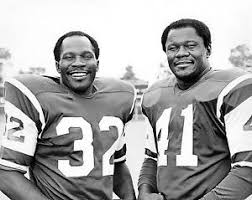
Matt Snell # 32 and Emerson Boozer #41
Both the Kansas City Chiefs and Oakland Raiders, the AFL representatives in Super Bowls I and II, had been soundly beaten by what many observers considered to be an aging Green Bay Packer team led by the iconic Vince Lombardi. Most football experts agree that when compared to the NFL the ten year old American Football League is a sort of minor league of professional football. The AFL might be entertaining and filled with characters like Broadway Joe Namath, but talent wise on the field itself, an AFL team like the New York Jets doesn’t stand a chance against a veteran NFL team like the Baltimore Colts.
After Namath makes his guarantee, Jets Head Coach Weeb Ewbank, nearly hits the roof. Ewbank is a veteran coach who believes that players and coaches alike should let their actions do the talking and keep their mouths shut.
For a decade, before switching leagues, Ewbank had coached the Baltimore Colts. He is well acquainted with their players and their game plan. Also, Weeb Ewbank is years ahead of his time when it comes to using film study as a tool to beat the opposition. He is quietly confident that his Jets, if they play smart and control the ball, can use their speed and aggressiveness to upset the slower defense of the Baltimore Colts. However, whenever he is asked about his team’s chances leading up to the game, Ewbank simply tells the media, “we’ll see,” and he’s afraid that Namath’s guarantee may have given Shula’s Colts extra motivation that the Jets don’t need.
However, as it turns out Ewbank’s fears were most probably unfounded.
Years later when Baltimore Colts Tight End John Mackay was asked why he thought his team had lost Super Bowl III he candidly said, “All we did was laugh. We thought it was a joke. And that was the problem. We had the wrong attitude.”
On the surface it would appear that Colts team owner Carroll Rosenbloom was so confident his team would win the game that he was even willing to arrange for the player’s family members to make the trip to Miami prior to the Super Bowl and stay at the same hotel as the players and coaches as if the entire Baltimore Colts organization was on some grand vacation in south Florida.
But were the Colts simply too cocky and was owner Carroll Rosenbloom just over confident in his team’s ability to beat the New York Jets? Or was there something more sinister behind it all?
At the end of the first half of Super Bowl III the Jets led by a score of 7 to 0. Five times the Colts had been inside the Jets twenty yard line and each time had either turned the ball over or failed to score.
Johnny Unitas had been injured for the majority of the 1968 season. In his place the Colts turned to veteran quarterback Earl Morrall and Morrall did not disappoint in 1968. That year Morrall was the NFL’s unanimous MVP and the Baltimore Colts entered Super Bowl III with Morrall as their starter and a healthy Johnny Unitas waiting in the wings on the bench.
Despite Morrall’s success during the season he ended Super Bowl III 6 for 17 passing with three interceptions. Perhaps, most egregious of all was the interception he threw at the end of the first half, when he got picked off on a short pass, despite having a wide open receiver in Jimmy Orr waving his arms in the endzone.
In a 2010 interview Morrall stated with regard to Orr being so wide open that he, “just couldn’t see him,” but even at the time many commentators found the fact that Morrall missed Orr on the play simply unbelievable. Many also questioned why, with Morrall obviously playing so poorly, Shula didn’t turn sooner to his franchise quarterback Unitas who was literally begging to get into the game? When Unitas finally entered Super Bowl III in the waning moments of the fourth quarter, and did in fact lead the Colts on their one and only touchdown drive of the game, it was already too late with time winding down and the Jets staked to a 16 to 0 lead.
In 1969 Super Bowl III might quite possibly have been the greatest sports upset in American history. But flash forward fourteen years later to 1983 and we get a different impression of the game entirely from someone who was there.
In 1983 nine year NFL veteran Bubba Smith who played from 1967 to 1976 and was a defensive end on the Super Bowl losing Colts team of 1968 published an autobiography entitled, Kill Bubba Kill.

Colts DE Bubba Smith lays a hit on Namath in Super Bowl III
In his book Smith claims that the result of Super Bowl III never sat well with him, or his teammates, because he says that at halftime when trailing 7 to 0, he and his teammates had urged Don Shula to change the game plan, specifically the defense they were running against the Jets, but that they were told to, “shut up and just play”.
Smith also claimed that after the game, while he was in New York, he was told by both a local bookmaker and by members of the NFL Players Association that the game had been fixed. There were also rumors, according to Smith’s autobiography and subsequent interviews among other internet sources, that Colts owner Carroll Rosenbloom had placed a three million dollar bet on the Jets to win the game only days before kickoff at about exactly the same time Namath had made his famous guarantee!
Rumors have also circulated, perpetuated primarily by Smith, that Don Shula was promised that “good things would happen for him,” by the then NFL Commissioner Pete Rozzelle if he took it easy and allowed the Jets to jump out to an early lead and win Super Bowl III.
The conspiracy theory goes that the NFL, who had already entered into a merger with the team’s from the AFL set to take effect the following season, desperately wanted to see an AFL team win a Super Bowl prior to 1970 so that fans would buy into the viability of the merger itself and believe that former AFL teams were in fact worthy competitors for their existing NFL counterparts.
Additionally, prior to the NFL/AFL merger and the 1968 season the NFL had signed the largest national television deal ever for a professional sport and, according to conspiracy theorists, wanted a championship team in New York to generate interest in the league and drive television ratings.
Despite losing Super Bowl III, Don Shula this time with a veteran Johnny Unitas behind center, would go on to win the Lombardi Trophy two years later in Super Bowl V and then move on to inherit the Head Coaching position for the Miami Dolphins, where he would lead one of the most successful franchises of the 1970’s and remain at the helm for over twenty years.
 |
| Don Shula during Super Bowl III |
In April of 1983 after the publication of Smith’s autobiography, The New York Times ran an article on the Super Bowl III conspiracy theory and in that article Shula referred to any speculation that the game might have been fixed as, “too ridiculous to even comment on.” And he further stated that, “we all missed a lot of opportunities that game, including Smith.”
After Super Bowl III the Jets would reach the AFC Championship game four more times in 1982, 1998, 2009 and 2010, but they have yet to advance to the big game since that fateful day so long ago when they shocked the world and defeated the heavily favored Baltimore Colts. It’s as if the New York Jets might be haunted by some sort of Super Bowl III curse.
So is there any truth at all to a Super Bowl III conspiracy theory? Well, probably not, at least there is nothing more than circumstantial evidence and hearsay.
Perhaps, Super Bowl III is simply an example of one team, who though maybe not as talented as the other, just tried harder and achieved the improbable through sheer effort and belief.
If there was anything radical about the World Champion 1968 New York Jets it might only have been that they were a team who believed that they could win and didn’t let anyone persuade them otherwise, but I can’t guarantee it.

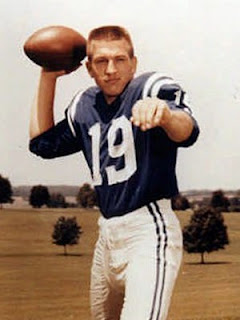


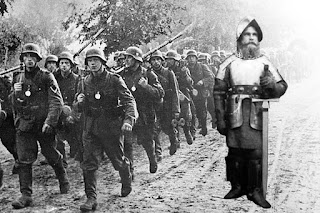

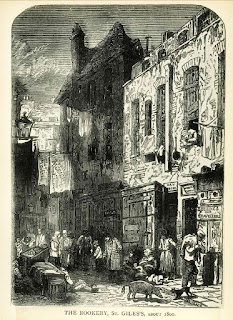
Comments
Post a Comment